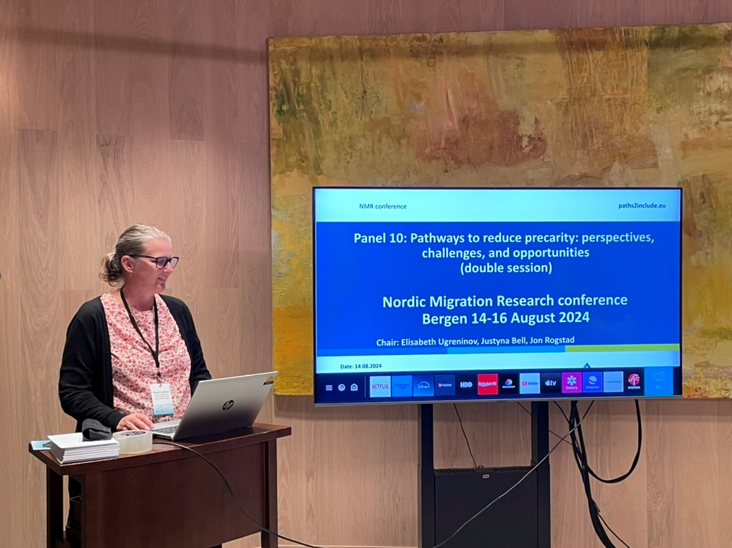Dr Elisabeth Ugreninov and Dr Justyna Bell, from OsloMet, attended the Nordic Migration Research Conference, in Bergen Norway from the 14th to the 16th of August.
The pivotal focus of this year’s conference was on politics of mobility and precarity giving the participants an opportunity to explore various contexts of unpredictability and insecurity for persons involved directly and indirectly in cross-border mobilities.
The PATHS2INCLUDE team organised one of the thematic sessions entitled Pathways to reduce precarity: perspectives, challenges, and opportunities, as an opportunity to bring together a range of perspectives of unequal access to resources, such as education, healthcare, welfare benefits, and work, and relate such factors to the intersection of e.g., immigration background, ethnicity, gender, disability, and age. All papers contributed to fruitful exchanges on how precariousness affects people differently depending on intersectional compilation of race, ethnicity, legal status, migration background, care responsibilities, class, age, gender, and education.
The following challenges have been raised during the discussions:
- Many immigrants experience a drop in status and /or are “overqualified” for their jobs, as such it is a need for policies facilitating good working condition and avoiding immigrants to take the “first bad job” and their education must be recognized with the same value as natives.
- Poor host-country language is a barrier for many immigrants entering the labour market, regardless of type of job and across industries. Language training must be relevant and at a low cost.
- Mother tongue is important for identity and belonging for children, youths and young adults in introduction classes, thus multilingualism should be valued as a strength and the teachers should have knowledge of different languages as this is central for learning outcomes.
The concept of precarity was discussed throughout the three days of the conference to, among others, investigate how it is produced and reproduced in political, economic and socio-cultural practices, especially through the processes of othering and racialisation; to probe the multiple contexts, policies and structures creating insecurities; and develop analytical tools to expose how certain systems are structured to strip individuals from protection.
In this context, not everyone who is affected by precarious conditions is a migrant. As one of the conference keynote speakers, Bridget Anderson discussed in her lecture, this perception allows us to make a connection between migrants and citizens in their struggles against precarity. Simultaneously, not all the migrants are equally exposed to precarity. Still, migration in itself produces multiple vulnerabilities relating to safety, health, maintenance of family relations, accommodation, employment, future prospects etc. Ayhan Kaya, in his keynote provided, for example, an interesting take on the expressions of hospitality (discussed in the particular context of state actors in Turkey towards Syrian refugees) as an ´othering´ practice having an inherent element of temporariness. In Kaya´s observation, every guest- even those who are genuinely warmly received- becomes contested and unwanted after the hospitality period expires, leaving the refugees in positions that foster their subordination and ´structural outsiderism´.
The constantly-expanding regulations to control mobility and migration- discussed extensively in the context of the Nordic countries during the conference- are indisputably the direct drivers of precarisation. These are further validated by the requirement for ´integration´ imposed on the migrants, where the individuals must continuously prove that they are trying to fit in.
Paradoxically integration, as policy and practice does not turn ‘migrant others’ into ‘us’ but reinforces their otherness becoming in itself a moving object that is not achievable for the newcomers. Shahram Khosravi in his keynote presented a critique of the concept of integration as inherently racialising and colonising exercise. He points out to the paradox of the rationale behind integration societies as homogenous and ahistorical constructs, that additionally strip migrants from their life histories. In Khosravi´s view a migrant is inherently ´unintegrationable´. In this context, integration becomes a metaphor that claims to be a measurable truth, something that is both socially and politically dangerous.

